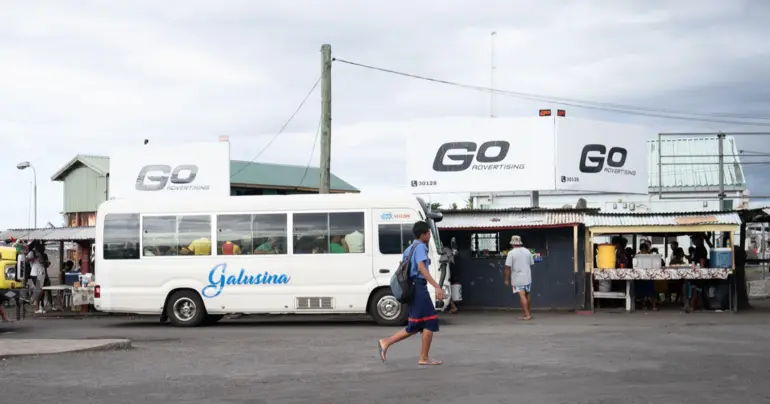Illegal waste dumping ongoing: M.N.R.E chief
 By Marc Membrere
•
30 January 2021, 10:00AM
By Marc Membrere
•
30 January 2021, 10:00AM
Rubbish burning and illegal waste dumping are an ongoing threat to Samoa's environment, and eliminating them is a top priority for the Ministry of Natural Resources and Environment (M.N.R.E), its new Chief Executive Officer says.
In an interview with the Samoa Observer, the Ministry's C.E.O., Frances Debra Brown-Reupena, who was appointed in late December, emphasised the harm such practices do to not only the environment but also people's health.
"[The] burning of rubbish such as plastics, and hazardous waste, in particular, release toxic chemicals (dioxins and furans) into the air that we breathe, [which] poses serious health risks to our people, especially to infants, the elderly and people with respiratory problems," she said.
"The high levels of dioxins and furans released in the atmosphere settle on crops, vegetables, and end up in our streams, lakes and rivers, entering our food chain, affecting our health."
The C.E.O. also spoke about the ramifications of illegal waste disposal, particularly dumping garbage in mangroves.
"Mangroves are important to maintain coastal fisheries, protect property and coastlines from the impacts of tropical cyclones, while also protecting coral reefs from sediments and pollutants," the C.E.O. said.
"Toxic chemicals from waste, non-degradable plastics, and sharps harm the environment, marine species, growth and health of mangrove ecosystems.
"In Samoa, most of the mangroves grow in areas protected by a coral reef. The mangroves and the coral reefs have a very special relationship: the coral breaks and reduces the force of the waves providing the mangroves with calm waters, while the mangrove roots act as a sieve filtering soil and dirt, that can harm the coral reefs.
"Rubbish dumped in rivers ends up in the sea creating marine debris which contaminates our oceans and marine life that we depend on for our livelihood."
Ms. Brown-Reupena said concerns were growing about plastic ingestion by fish.
"There is very little data available for Samoa," she said.
"The recently launched Samoa Ocean Strategy 2020 – 2030 identifies land-based pollution as a key threat to the health of Samoa’s ocean and resources."
Ms. Brown-Reupena said the Government's ban on single use plastics will help to mitigate the problem.
She said there were ongoing efforts by the Ministry to enforce existing legislation, such as banning the illegal disposal of rubbish. Ms. Brown-Reupena also said the Ministry was focused on raising awareness about the health of the environment and natural resources and their role in sustaining livelihoods and people's health.
Ms. Brown-Reupena said M.N.R.E. conducts ongoing awareness programs through the media, targeting schools and communities for consultations and presentations on waste-related issues, such as illegal dumping.
"We have also developed waste materials to promote key messages to communities and schools," she said.
Ms. Brown-Reupena acknowledged that higher-level collaboration to implement these community-driven projects and initiatives are supported through funding from the Global Environment Facility's Small Grants Programme and Civil Society Support Programme. These community projects include waste audits, mangrove cleaning and rubbish collection.
"The Ministry also undertakes river cleanups with its partners and communities where waste is segregated, recorded and disposed of appropriately," she said.
"We also encourage communities to report in illegal activities such as illegal dumping of rubbish and burning of rubbish. Reported illegal acts are investigated by the Ministry, recorded and dealt with according to the law.
Ms. Brown-Reupena said citizens and communities need to stop disposing of rubbish near mangroves, rivers, and public places; to keep Samoa clean by working together.
The C.E.O. acknowledged the support of the Ministry's key partners, such as the Secretariat of the Pacific Regional Environment Programme, the United Nations Environment Programme, the Global Climate Fund, the Japan International Cooperation Agency, the long-standing Project for Promotion of Regional Initiative Solid Waste Management and Conservation International.
She said that the Ministry also welcomes the addition of the United Nations Development Programme which has joined forces with the government and its partners to address the issue of waste in Samoa.
"The Ministry also acknowledges the proactive stance of our partners in the private sector namely Samoa Stationery and Books and Nissan to address growing problems with electrionic waste.
"We would also like to make mention the outstanding work of our environment N.G.O.s and ambassadors such as the Samoa Waste and Recycling Management Association, the Samoa Youth Climate Action Network, Pro Green, the Faleaseela Environment Protection Society, the Samoa Conservation Society and the Siosiomaga Society.
"The Ministry is also very proud and registers its full support of the entrepreneurial work of Mana Care Products," she said.
 By Marc Membrere
•
30 January 2021, 10:00AM
By Marc Membrere
•
30 January 2021, 10:00AM











